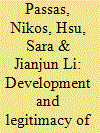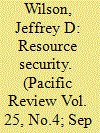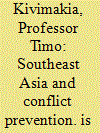|
|
|
Sort Order |
|
|
|
Items / Page
|
|
|
|
|
|
|
| Srl | Item |
| 1 |
ID:
114818


|
|
|
|
|
| Publication |
2012.
|
| Summary/Abstract |
As in many other developing countries, Chinese businesses and individuals frequently fund transactions using informal, unmonitored financial methods. The impact of this phenomenon is both positive and negative: positive when funds are used for legitimate purposes, such as providing much needed working capital for businesses, and negative when funds are used for illegitimate and/or illegal purposes, such as to finance criminal activity or launder proceeds of crime. There is a dearth of literature and research on this topic. Further study is necessary to understand the precise political, economic and social reasons for this diversity of non-bank financing and its legal and economic implications. This paper aims to pave the ground for such research and analytical work by reviewing the existing literature, placing it into context and raising the main questions that must be answered in future work.
|
|
|
|
|
|
|
|
|
|
|
|
|
|
|
|
| 2 |
ID:
114816


|
|
|
|
|
| Publication |
2012.
|
| Summary/Abstract |
The government of Hong Kong has been trying to reform the territory's health care financing system since the early 1990s and is finally on the verge of succeeding. The objective of this paper is to assess the reform efforts and explain the causes of repeated failures and eventual success. It will argue that the government's fortunes changed only after it abandoned the core reform goal and decided to pursue peripheral objectives. It will explain the abandonment with reference to the peculiar political system in Hong Kong that makes it difficult for the government to adopt substantial policy reforms in the face of even moderate opposition. The reason for the government's policy incapacity is the existence of liberalism in a non-democratic setting, which allows the government to neither suppress opposition nor mobilize popular support. This has been illustratively evident in its health care reforms when its proposals to improve the system's fiscal sustainability invariably met an early death because they imposed costs on employers, the population or both. The current proposal has fared better not only because it addresses a simpler peripheral problem but also because it offends almost no one and pleases many among the powerful.
|
|
|
|
|
|
|
|
|
|
|
|
|
|
|
|
| 3 |
ID:
114819


|
|
|
|
|
| Publication |
2012.
|
| Summary/Abstract |
Does recognition matter for a region as much as it does for a state and a person? This article examines the power of recognition in shaping regional cooperation. Rather than focusing on the behaviours and interactions between member states, which most studies have done, this article introduces a recognition model to investigate how the social practices of a region with non-member entities promote regional cooperation. By viewing recognition as a tradable commodity and an independent variable, the framework illustrates how the contest for recognition permeates beyond interpersonal and interstate interactions to include the struggle for recognition by regions. The model hypothesizes that the extent of recognition accorded to a region has an influence on its development. Drawing on newly released US declassified diplomatic records, this article tests the soundness of the proposed recognition model for regions by analysing the Association of Southeast Asian Nations' (ASEAN) struggle for recognition in the 1970s. It discusses how recognition was traded between ASEAN and three foreign powers, namely the USA, Japan and the European Economic Community, during the grouping's formative years. The findings suggest that the strengthening of a regional concept is influenced by the willingness of, and the extent to which, foreign powers recognize the entity. The central theme of this article is that recognition plays an important function in the development of a regional concept.
|
|
|
|
|
|
|
|
|
|
|
|
|
|
|
|
| 4 |
ID:
114815


|
|
|
|
|
| Publication |
2012.
|
| Summary/Abstract |
Following a historical commitment to multilateralism, in the last decade the trade policy initiatives of many states in the Asia-Pacific have turned to bilateralism through the negotiation of free trade agreements (FTAs). The corresponding proliferation of regional FTAs has thus far been understood to result from three broad motivations: a desire to advance trade liberalization beyond World Trade Organization (WTO) disciplines; mercantilistic efforts to secure preferential access to key export markets; and/or attempts to use FTAs to secure non-economic political gains. This paper argues that since the middle of the decade a new motive has emerged - the use of FTAs to improve resource security - particularly by import-dependent resource consumers in Northeast Asia. As yet unexamined in the literature, this paper seeks to document and explain this trend. It analyses the recent emergence of resource security concerns as a new FTA motive; the corresponding shifts in the FTA strategies and initiatives of Japan, Korea and China; and the dynamics of an emerging race for resource-related FTAs between the three governments. Based on this analysis, it demonstrates that resource-related FTAs could potentially improve consumers' resource security through either the liberalization of trade, the extension of investment protections or broader diplomatic gains with the targeted supplier. However, owing to supplier reluctance to enter into binding policy commitments for resource industries, their track record shows success in only the diplomatic dimension, and the prospects for a strengthening of their effects are poor. As a result, it is argued that while resource concerns have become a key motive for FTA initiatives in the Asia-Pacific region, they have not substantively improved resource security for its import-dependent states and are unlikely to do so in the future.
|
|
|
|
|
|
|
|
|
|
|
|
|
|
|
|
| 5 |
ID:
114817


|
|
|
|
|
| Publication |
2012.
|
| Summary/Abstract |
This article examines prospects for solidarity, defined as an ethos of collective responsibility that works across a political community's normative values and policy decisions, as a unifying idea that can inspire and promote steps toward regional political community across East Asia. Just as the European Union's (EU) founders and its past and present visionaries have appealed consistently to an inclusive, transnational model of solidarity in framing and pursuing European integration, notions of solidarity also contain important affinities with prospects for building an East Asian community. First, the paper examines how the idea of solidarity has evolved in European political thought and especially how solidarity has emerged repeatedly as one of the important concepts throughout the political development of the EU. Then, the paper turns to East Asia and considers the relevance of solidarity as an important principle in aspirations and endeavors toward the creation of an East Asian community. We base our analysis upon a variety of sources, including statements and speeches from key political actors, scholarly books and articles, and news accounts and commentaries. We illustrate how earlier manifestations of solidarity in East Asia have often been cast in ways that set the region apart from the rest of the world and have framed particular groupings of Asian countries in opposition to the West, and we argue that a redeployment of solidarity is needed in East Asia that instead emphasizes an ethos of collective responsibility among the principal national actors and external stakeholders within the region and beyond. In contrast with interpretations that suggest that the conditions for developing East Asian community are inescapably distinct from the circumstances in Europe during the second half of the twentieth century, we argue that the idea of solidarity has great potential to advance regional collaboration in East Asia.
|
|
|
|
|
|
|
|
|
|
|
|
|
|
|
|
| 6 |
ID:
114814


|
|
|
|
|
| Publication |
2012.
|
| Summary/Abstract |
If the assessment of ASEAN's success in the past is difficult, speculations on whether ASEAN will be a success will be close to impossibility. Yet this is what is intended in this article. However, this is done by first defining robust criteria of success of conflict prevention. Conflict prevention is successful if conflicts and battle deaths can be avoided, either by means of conflict resolution or transformation, or simply by means of conflict avoidance. By starting with this criterion the article will argue that ASEAN peacefulness cannot be explained by durable objective conditions. Instead, it is built on imagined realities. The imagined realities of the ASEAN Way are getting more difficult to sustain due to their interaction with material and normative/institutional developments. Many of the constructed foundations of the ASEAN Way are unsustainable in the new realities where communication has become easy and uncontrollable, and societies have become wealthier and more democratized. However, the article will show that evidence of existing conflict violence suggests that ASEAN has started to reformulate its approach to conflict prevention and that this has largely been successful.
|
|
|
|
|
|
|
|
|
|
|
|
|
|
|
|
|
|
|
|
|